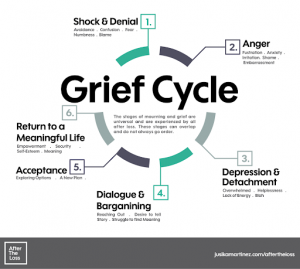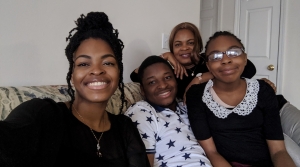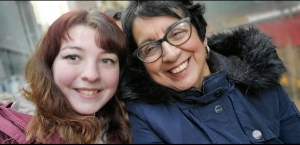Grief. That’s what this feeling is.
We are grieving the college experience we thought we were in store for. While others may be going through more tangible losses of family members and employment opportunities, our grief is just as valid. No matter how much you have lost in this process, you have still experienced loss. Grief is said to come in six stages: Shock & Denial, Anger, Depression & Detachment, Dialogue & Bargaining, Acceptance, and the Return to a Meaningful Life. Let me take you through my grief process for my last semester of college, and hopefully you can find some familiarities and a sense of hope in your own ability to process this loss.
Shock & Denial
The second I heard that in person classes were cancelled until April 13th I immediately packed a bag and left campus. I did not process, I did not say goodbye, I did not think anything through. I just left because I did not know what else to do. How could my senior year just have been minimized by such a margin? How could my formal and Greek Week and my internship all just be obliterated? My dad promised me Chinese food and a warm bed to sleep in at home an hour and a half away, so I just left and tried to clear the confusion from my mind. I told him that there was no way they wouldn't let us come back for the last few weeks. They had to let us finish classes in person, to have finals week, to have our weekend in Put-In-Bay… to have commencement. So, I took baths, enjoyed the free food, reveled in having my own bathroom again, and tried to think of this as a little “vacation” from reality. I was in denial up until the moment we got the email completely cancelling our final semester as college students.
Anger
Throughout the day I would remember the situation and get angry all over again. I would just walk around the house permanently frustrated. If my parents tried to talk about the situation I would be pissed off, if they tried to talk about something else I would be pissed off, and if my dogs barked at the wrong moment in my ever spiraling thought process I would be pissed off. I described it to my mom as “wearing a vest of anger,” I felt it constantly weighing down on my chest, inhibiting everything I wanted to do to cope. I was more aggressive and quick to anger that I had ever felt. I perceived every form of communication as a threat. I assumed that the world intended to just keep hurting me and that no relief would come. This stage ended when I finally sat down with my mom and explained how much pain I was in.
Depression & Detachment
As someone prone to depressive episodes, this stage almost felt comfortable. I would stay in bed all day and avoid responding to texts. It was a daily struggle to convince myself to shower and do basic self care tasks. I didn’t feel like eating healthy or working out. I wanted to be alone. I was honest with my boyfriend about how low I felt. I wanted to be as far from my old life as possible, in order to ignore the feeling of loss I had. If I didn’t think about my friends and my opportunities, I couldn’t miss them… right? I broke out of this stage when a friend finally got a hold of me, and we had a genuine conversation for the first time in a little while. She reminded me of just how much life I have yet to live.
Dialogue & Bargaining
I would say that I’m currently in this stage. These stages take time, and no one is expected to be out of them in any “perfect” timeline. I feel more at peace with my new normal, and ready to start adapting to my new life. I am thinking ahead to the fall, and making adapted plans in case this continues. I am keeping my options open, while also trying to keep my future plans intact as much as humanly possible. Part of my dialogue of healing is writing this article and getting my feelings out. I’m trying.
Acceptance
How long will it take to get to this coveted stage? Who’s to say. Could be days, weeks, months… and I’m okay with that. I understand that this situation is still very uncomfortable for me, but I also understand that some day it won’t be. I’m trying to do a better job of being emotionally transparent with those close to me in order to help this process along as smoothly as possible. Open and honest communication is the keystone of healthy grief. Eventually, through the employment of healthy and progressive coping mechanisms, we grieve and we heal.
Return to a Meaningful Life
Ideally, this will be when the quarantine is over… but we really have no idea when that will be. To take pressure off of myself to heal, I am trying to create a culture of meaningful life in my current situation, so that I do not feel the need to hold myself back until a formal “resolution” is found. Sure, I can hypothesize that a graduation ceremony or return to tactile schooling will fill this need… but I don’t want to set myself up for failure by setting these restrictions on myself. Grieving is a process that must be felt in it’s own time, and one that you must totally give yourself up to.
A lot of these stages aren’t pretty, and I’m not afraid to admit that. I’m not all too proud of my behavior and how the grieving process has affected me. But - *spoiler alert* - I’m human… and so are you. We all process grief and loss in our own time and in our own methods, with these stages as a potential common theme. It is normal, natural, and VALID for these next few months to be a little tender for us. We lost our last semester. We have every right to feel this grief, and heal from it on our own schedule.
Sending love to the Class of 2020 and to anyone who has felt a great loss from this horrific situation. Stay healthy and never forget to address your personal wellness as another factor of health. We are all in this together.
- Anabelle Nietupski ‘20
Resources
JCU Counseling Center continues to provide virtual services to support all JCU students.
Other Resources including 24/7 crisis support services, info on how to cope with emotional reactions to everything related to the pandemic all the resulting changes to daily life, and suggestions on how to maintain some routine and normalcy in our lives.
We encourage everyone to connect with each other virtually in general, and even more specifically to connect in order to process these feelings of grief and loss. Students can do that on their own, within their student groups, and soon the Counseling Center will offer the JCU community opportunities to request Zoom presentations or facilitated group discussions on various topics. Topics may include 1) Counseling Center services, 2) coping with anxiety/worry, 3) coping with grief/loss, and 4) coping with day-to-day stressors like increasing productivity and maintaining social connection. Look for more information through Inside JCU and their website.
Esther Mba - Keep the Distance, Flatten the Curve
I know a lot of people are on edge because of the current COVID-19 crisis going on globally and the alarming rates at which the cases are increasing, but one way that we have been advised to “flatten the curve” is SOCIAL DISTANCING. This is aimed to result in a controlled reduction of the cases by limiting our level of social interaction. However, this has proved to be a challenge, especially for young people who live by the phrases “Live your best life” and “You Only Live Once (YOLO)” who still move about and act oblivious to the warnings of health organizations and the government. But I hope that by the time people are done reading this, we will better understand the need to practice social distancing.
As young people, the tendency to be rebellious is almost inevitable. Some feel it more than others but it is still a feeling that is very present in us because we want to make the most of our youth, even if it means breaking a few rules to do so. However, when the rules are made to protect us from ourselves, we need to ask ourselves whether the rebellion is worth it. Social distancing is a strongly recommended method of effectively handling COVID-19 by reducing exposure to each other and the environment. This is because the virus is transferred through droplets (sweat, saliva, etc) and can be easily spread by people who cough, sneeze, or by touching a surface that has been contaminated. And since no one really knows where people have been, it is better to be safe than sorry by staying and protecting yourself and the people you care about. But some young people see this as “grown-ups trying to stop them from having fun”.
There are other methods of avoiding the virus such as, keeping your hands sanitized, washing your hands for at least 20 seconds, coughing into your elbow, not touching your face, etc., but these other methods can only go so far, especially for those who have already been infected. Which is why we need to take those extra measures to ensure that we are not at risk of catching the virus.
Personally, I have been practicing social distancing as best I can, even though it’s not the most fun thing in the world. But finding ways to make things interesting is usually the fun part. As annoying as it might be sometimes, I know who I am helping by practicing social distancing. I am helping my family, my friends, and the people in the community that I live in, in some way also helping the world by reducing the statistics. At the end of the day, the sooner this goes away, the sooner we can return to our normal lives and appreciate the world a lot more.
Angela Burns
I was devastated when I was told that I would have to pack up all of my things, leave the dorm room that I called “home” and abandon all of my friends for the rest of the school year, I was absolutely devastated. I was scared, and did not want to spend the rest of my school year at home and without my friends. This time is extremely exhausting, demanding, and even inconvenient. This time can be made even more difficult for students who are dealing with mental illness, as well as unfortunate home situations. I personally struggle with generalized anxiety disorder and major depressive disorder. I can also personally say that being without my friends has been intensely fatiguing, especially since I love being in the physical company of others. I know many other people do as well, but there is so much technology nowadays. Although it cannot in any way replace the experience of being in the physical presence of others, it is still helpful to utilize programs such as Skype, Zoom, a simple phone call, FaceTime, Google Duo, and Netflix Party during this difficult time.
I know we, as the younger generation, sometimes feel that this time of social distancing is not meant for us. That it is unimportant, that we are stronger than the coronavirus, and some might say that we are “immune.” Although for a majority of the younger population the risk of the coronavirus is not as great as the risk for the elderly population, those that suffer from prior health conditions and those that have a weakened immune system, a prior condition that compromises their immune system, the risk is still prominent. Lately, more and more young people are becoming hospitalized from the Coronavirus, and even ending up with permanent lung damage from it. Also, even if we do not catch the virus ourselves, we are still able to be carriers for the virus and have the possibility of catching either a mild or severe form of the virus. Being a carrier is especially dangerous because that means the person is asymptomatic and does not know that they have the virus. The virus could then unknowingly be passed onto others, and possibly to someone who could experience a very severe case with a less chance of recovery.
I personally am staying home and practicing social distancing for my grandma. She is in the at-risk category because she is older and has pre-existing health conditions. I’ve always had a very close relationship with her and I love her with all my heart. Since I have been raised by a single-mother, my grandma has helped to raise my brother and I for our entire lives and has continued to do so. She has done so much out of the goodness of her heart to make sure that we would have a good life. This small, tiny, little favor of staying inside my home and practicing social distancing is something that I owe to my grandma. I’m doing this selfless act for her because not only is it a simple and easy task, but it is also something to show her how much I care about her. For all that my grandma has done for me, staying inside and limiting my exposure for her is a small price to pay.
As college students, I recognize that sometimes we have this concept that the world is revolving around us. We have a full course load and are just trying to live our lives. I, too, am guilty of being selfish. But, I just ask that during this time you attempt to take a step out of the box and practice being selfless in order to protect those around you. I’m sure most of us have someone or multiple people that we love that we do not want infected with this virus. Practicing social distancing and staying at home is the greatest example during this time to show your selflessness while also protecting those you love the most. I understand this is a very heavy topic, but the amount of people that are not remaining in their homes and not practicing social distancing is what is causing the continual increase in cases of the Coronavirus. As I finish writing this, I just ask you to reflect on this: is going out (for any reasons besides for food, medication, or other life-sustaining reasons) really worth the risk of potentially infecting those you care about?
Resources
Mental Health, Mindfulness and Meditation AppsBreatheCalmMood ToolsHeadspace


